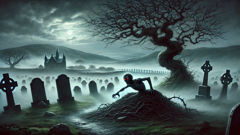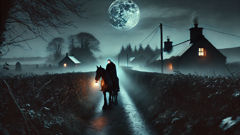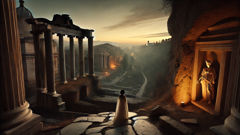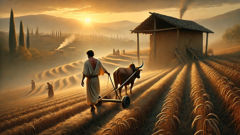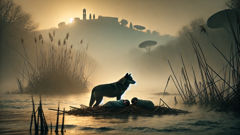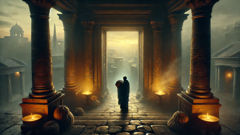Introduction
In the wild, rolling hills of medieval County Derry, there existed a place where the ground itself seemed to shudder with secrets, and the mists curled in ways that whispered of old curses. It was a land where peat bogs swallowed careless feet and ancient hawthorn trees stretched twisted limbs over fields veined with stone walls. Here, the people knew that stories grew as thick as the brambles—some born of hope, others of warning. None, though, chilled the bones like the legend of the Abhartach. This was no ordinary tale of heroics or lost love. The Abhartach was said to be a chieftain of unusual stature, a dwarf by birth but a giant in cruelty. His reign was marked not by wisdom, but by terror—his hunger for power only outdone by his taste for the suffering of his kin. No one could say what foul bargain he’d struck with darker forces, but under his rule, the sun seemed to linger less and the night stretched longer. And when at last he fell, slain by a rival who hoped to free the land from his grasp, the people rejoiced. Their celebration was short-lived. The earth would not hold him. The Abhartach rose again, his heart blackened and his thirst unholy—no longer content with mere power, but craving the blood of the living. This is the story of the Abhartach: a tyrant whose evil could not be buried, and whose legend stained the hills of Ireland for centuries. To this day, when the fog rolls in and the moon is thin, locals glance over their shoulders, whispering the name they dare not call aloud. For they know some legends are born from truth, and some truths are best left undisturbed.
A Tyrant Among the Living
Long before darkness truly fell over the land, the people of Glenullin lived in uneasy submission to the chieftain called Abhartach. Unlike the tall warriors celebrated in bardic songs, Abhartach was small in stature—a head shorter than any other man. Yet his eyes flashed with an unnatural cunning, and his voice had a bite that cowed even the bravest. He ruled from a ringfort perched on a rise, its walls ancient and moss-slicked, surrounded by thorns as twisted as his own ambitions.
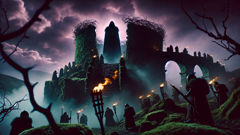
No feasting fires burned long in his halls. He trusted no one, and the flicker of torchlight was more often a signal for cruelty than celebration. Tales traveled fast on the wind: how he punished those who spoke against him, how he’d driven rival clans into the bogs or had them buried in the earth alive. Mothers hushed their children with his name; wise men avoided his path.
The seasons turned sour under his watch. Cattle grew thin and milk soured overnight. Crops withered inexplicably, despite the prayers and offerings to old gods and saints alike. Some whispered that Abhartach’s mother had cursed him at birth, or that he bore the mark of an ancient evil; others swore he consorted with spirits in the stone circles outside his fort. Whatever the cause, a shadow seemed to follow him—one that grew heavier with each passing year.
But even tyrants are not invincible. Word spread that a chieftain from a neighboring territory—a man named Cathán—could bear no more of Abhartach’s reign. The two had clashed in council before, and now, with famine gnawing at his own people’s bellies, Cathán marshaled his bravest warriors and set out under cover of night. The battle was fierce and short. Abhartach, furious and shrieking curses, wielded his blade with the wildness of a cornered animal. Yet he fell, his blood soaking into the very earth he’d stained with cruelty.
His body was buried swiftly in the old manner, in a deep grave at the edge of a hawthorn grove—his favorite haunt in life, now his prison in death. Relief swept Glenullin. Bells rang; people gathered, daring to hope that brighter days might come. For a moment, the air itself felt lighter. Yet not all evil can be so easily laid to rest. Within days, a thick mist began to rise from Abhartach’s grave, even on the brightest afternoons. The air turned sharp, and animals refused to graze nearby. Then came the stories: a cold presence felt on lonely roads, strange tracks in the mud that led nowhere, and—worst of all—the discovery of a shepherd, pale as milk and drained of life, not a mark upon him but for two neat wounds at his throat.
People gathered in fear at Cathán’s hall. Had they not buried the tyrant deep enough? Had they neglected some vital rite? Elders scoured ancient texts and called upon druids for counsel. The answer was grim: Abhartach was no longer a man, but something else entirely—a revenant, bound by fury and a hunger for blood. The chieftain’s victory had loosed a horror upon the land that no ordinary blade could quell.
The First Rising
The nights that followed were thick with dread. In Glenullin’s cottages, doors were barred tight and windows shuttered even before dusk. Yet fear seeped through every crack, for it was said that Abhartach’s spirit was no mere ghost. He walked again—corporeal, his feet muddy with grave earth, his breath cold as stone. Witnesses spoke of a hunched figure gliding between the standing stones, his cloak tattered and eyes glowing red, searching for warmth to steal.
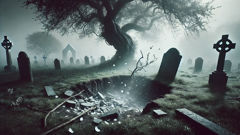
One night, Cathán himself was roused by urgent knocking. A farm girl—her hair wild and eyes wide with terror—told of seeing Abhartach at the edge of her family’s land, hands outstretched as if beckoning her father to the grave. Cathán gathered his men and torches, setting out for the hawthorn grove. The air grew icy as they approached. When they reached Abhartach’s grave, they found it disturbed—stones cast aside, earth gouged open as if from below. No sign of a body remained. Yet on the grass lay a trail of bloodless, white petals from a nearby bush, and an unnatural hush gripped the woods.
Panic spread. The next dawn, two more were found dead in their beds—pale, lips tinged blue, with those same twin punctures at the neck. The village healer declared it witchcraft, but the elders knew better. They remembered old tales from the time before St. Patrick, of creatures that drank blood to sustain their unnatural life. The word vampir came to their lips, though none dared say it too loudly for fear of summoning its power.
Desperate, Cathán sent word to a druid named Eithne, renowned for her knowledge of dark things. She arrived wrapped in grey wool, her staff carved with symbols that predated Christianity. She walked the land for three days and three nights, observing the mists and the birds that would not sing. Eithne declared that Abhartach could not be slain as a man. “He is Níamh-Mairbh—an undead thing. His spirit is tied to this place by blood and betrayal.”
She ordered that his grave be found and prepared anew. With trembling hands, the villagers dug deeper than before. At last they found him: Abhartach’s body, rigid yet uncorrupted, eyes open and blazing with malice. At Eithne’s command, they drove a yew-wood stake through his heart—a tree sacred for its connection to both death and rebirth. The grave was filled with thorns and heavy stones. For a time, peace returned.
But peace is fragile. A fortnight later, under a blood moon, Abhartach rose again. The yew stake lay splintered beside the grave, and the stones had been tossed aside as if by some monstrous force. This time, he walked openly among the shadows, taking the blood of animals and men alike, his hunger growing with each night. Fields grew colder; the streams clouded as if with old blood. Glenullin became a place shunned by all but the desperate.
Cathán was beside himself with guilt. Each attempt to lay Abhartach low—iron blades, holy water, prayers in Latin and Gaelic—failed. No matter how deeply they buried him or how many stakes they drove, he always returned. The people spoke of leaving, but Eithne counseled patience. “There is an old law,” she said, “older than kings or saints. Some dead must be bound with three things: thorn, stone, and blood not their own. Only then will the earth accept them.”
The Binding of the Undead
Word spread far beyond Glenullin of the blood-drinker haunting the hills. Travelers skirted the region entirely, and even neighboring chieftains sent prayers and offerings to keep Abhartach’s curse from crossing their borders. Cathán grew thin and haunted; Eithne’s face became gaunt as she delved into rites seldom spoken of since Ireland’s pagan days.

With careful preparation, the villagers gathered on a night chosen by Eithne—the new moon, when the barrier between worlds is thinnest. They brought yew wood, hawthorn branches, iron blades, and a great flat stone quarried from the hill’s own heart. Eithne instructed them to mingle their own blood—just a drop from each—into a bowl and pour it over Abhartach’s grave, binding him to the land not as a ruler but as a captive.
They found him wandering among the tombs, his skin drawn tight over sharp bones, mouth stained crimson. He moved with inhuman speed, yet recoiled from the touch of hawthorn. The villagers encircled him, chanting words older than memory. Eithne herself drove the final yew stake through his chest as Cathán pressed hawthorn branches into the wound. The others pinned him with iron blades and heaved the flat stone atop his body, sealing him into the earth.
As the last words of the rite were spoken, a scream erupted from beneath the stone—so shrill that birds fell silent for miles around. The air grew still and heavy; a mist gathered and pressed down upon the land. The people wept, not just from relief but from exhaustion and fear that the seal might someday break.
Seasons passed. Crops slowly returned to health; cattle fattened. Children played near the ringfort again, though none ventured close to the hawthorn grove where Abhartach was bound. Yet in the quietest hours before dawn, some claimed to hear a faint scratching beneath the stone, as if nails scraped forever at the prison walls.
In time, Cathán grew old and died. Eithne vanished into the wilds, her fate unknown. But the tale of Abhartach lived on, whispered by firesides and carved into crude stones at the edge of the cursed grave. He became a warning—of what happens when evil is left unchallenged, and when the dead are not given proper rest. Some said he was a demon, others a man driven mad by power. The truth lay tangled with the roots of the hawthorn: Abhartach was Ireland’s first vampire, a dark shadow on her history, his thirst echoing through the centuries.
Conclusion
Centuries have passed since Abhartach’s final binding, but his legend endures in the mists of County Derry. The stone still sits in a lonely field, half-sunken and overgrown with nettle and hawthorn—the locals call it Leacht Abhartach, and few dare approach it after sundown. They say the ground there never grows sweet grass, and birds avoid the air above. Old stories linger, shaping the land and its people: a warning against tyranny and cruelty, and a reminder that some hungers can never truly die. The tale of the Abhartach gave rise to later legends—of vampires and the restless dead—but for those who live nearby, it’s not merely myth but living memory. Each year, when the fog spills down from the hills and the moon glimmers pale and cold, children huddle by their firesides while their elders recount the tale once more. And though times have changed and science offers new explanations for old fears, the lesson remains: beware those who would drink deeply from power, for they may return to drink from you. For as long as stories are told and shadows linger, the Abhartach will never be fully laid to rest.

